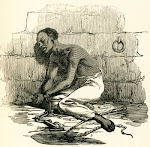 Good Hair, the Chris Rock movie (documentary), makes many statements about black folk preoccupation with their hair. No, I don't think blacks are the only racial group with this fixation--the beauty industry, which hair is a large part of, crosses racial lines, pulling in billions of dollars from many ethnic groups, regardless of color.
Good Hair, the Chris Rock movie (documentary), makes many statements about black folk preoccupation with their hair. No, I don't think blacks are the only racial group with this fixation--the beauty industry, which hair is a large part of, crosses racial lines, pulling in billions of dollars from many ethnic groups, regardless of color.No, I'm not going the discuss the right or wrong of this fixation: I don't care about that as an issue--I'm well aware that we're not our bodies (We're more than that!), and that we don't get to take them with us when we vacate this world, leaving behind pierced ears, noses, tattoos, as well as hair, whether it's our personal hair, or whether it once belonged to another.
"When Chris Rock's daughter, Lola, came up to him crying and asked, 'Daddy, how come I don't have good hair?' the bewildered comic committed himself to search the ends of the earth and the depths of black culture to find out who had put that question into his little girl's head. Rock visits hair salons and styling battles, scientific laboratories, and Indian temples to explore the way black hairstyles impact the activities, pocketbooks, sexual relationships, and self-esteem of black people. Celebrities such as Ice-T, Kerry Washington, Nia Long, Paul Mooney, Raven Symone, Maya Angelou, and Reverend Al Sharpton all candidly offer their stories and observations to Rock while he struggles with the task of figuring out how to respond to his daughter's question. What he discovers is that black hair is a big business that doesn't always benefit the black community and little Lola's question might well be bigger than his ability to convince her that the stuff on top of her head is nowhere near as important as what is inside."
I would urge you to watch this film, even if you have seen it once before (It's now on cable.), not because you'll learn more about weaves, extensions, the hair-dressing industry, the latest beauty-shop gossip, or any such thing, but for the statements it makes about us as a people--candid observations, visual, as well as spoken, about how well we serve our own economic self-interest.
E. Franklin Frazier, sociologist, author, and university professor, once posited this thesis, and I paraphrase: As integration (racial intermixing) becomes a greater reality in this country, black institutions will become less important--will, as a result, disappear. A safe thesis to be sure. Upon reading that, I countered: black institutions, for that reason (the on-going existence of segregation), won't disappear altogether, any time soon, because full "integration," for all its promises, will be slow in coming, and dearly bought.
And, for the most part, that has been the case--defacto segregation often rules the day within our nation, despite federal legislation and court rulings to the contrary.
Until such time that true and full integration is our lot, it behooves blacks to operate in their best economic interest--an interest that has been largely ignored over the years, notwithstanding the status of racial integration. Rather than focus on what is best for us as a people, we pretend, to our financial and economic detriment, that we're an integral part of the mainstream, when in fact we're a mostly isolated people, crowded into various enclaves throughout this vast nation.
From the documentary, you will learn that the black hair-styling industry is a multi-billion dollar industry, and that others (non-blacks) outside of the black community are banking most of those billions that this industry produces.
You will learn that there are only four black hair-care product companies, out of a hundred or so, producing their own black hair-care product lines, and that blacks aren't fully represented in an industry of which they're the principal consumer--not at the production, nor the distribution end.
Unfortunately, what is true for the black-hair industry is also true for other industries--clothing, food, housing, banking, what have you. Until we own the production and distribution end of what we consume, we can't hope to improve measurably our economic condition in this country in a major way, but, rather, give to others our hard-earned income--money that will be reinvested, not within our black communities, but beyond our boundaries.
And, sadly, we have no one to blame but ourselves.







No comments:
Post a Comment